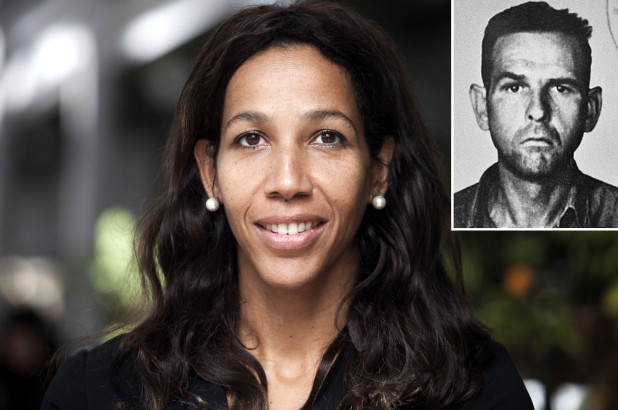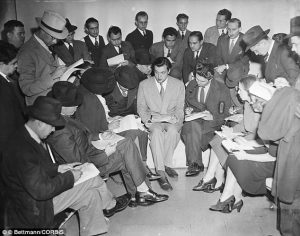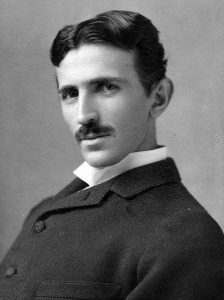“I am dreaming: I am swimming in a dark lake, the water as thick as tar. Suddenly corpses appear all around me: spindly figures, skeletons almost, that have had everything humane taken from them.”1
From an outside perspective, her life appeared perfect. Not the slightest of struggles seemed to bother her. She traveled, had a successful career, and a wonderful family. However, her life was quite the opposite. Jennifer Teege struggled with her inner demons; she appeared as a light to the world, but her mind seemed to be victimized by a mysterious sadness and a feeling that she did not know the root cause of, yet always knew that a protruding emotion was seizing her. Nonetheless, finding out the reason behind one’s sadness can be hard when one doesn’t even know why one feels that way. But what if one day you made a connection to this emotion unexpectedly, maybe at a library? This was the case for Jennifer Teege, who found out the harrowing secret of her biological grandfather Amon Goeth. Goeth was a Nazi commander responsible for the torture and mass killing of innocent Jews in Poland. He was a killer who wouldn’t have hesitated to kill his own granddaughter Jennifer if she would have ever been in his presence. This was a hidden secret that she discovered by curiosity, but it led her to the truth of who she descended from, and to the realization that she shares a cold-hearted killer’s blood. Will she let this new truth change her outlook on life or will she persevere through her new findings?On June 29, 1970, Jennifer was born in the city of Munich, Germany. Her mother Monika was twenty-five when she had a short fling with a Nigerian student. Their short affair resulted in Monika becoming pregnant with Jennifer. Jennifer’s mother battled with depression. Therefore, it was hard for her to maintain a job and provide for her daughter. So when Jennifer was four-weeks old, Monika left her at Salberg House, which was a Catholic home for infants. During her time at Salberg, Jennifer’s mother would often visit her and occasionally take Jennifer to visit her grandmother Ruth. At three years old, Jennifer was put into a foster home; four years later, at age seven, Jennifer was adopted by her foster parents, Inge and Gerhard Sieber.2 Growing up, Jennifer found great interest in learning about the Holocaust. She read book after book about the Nazi regime. She was intrigued on why the commanders of concentration camps would commit such horrific acts. During her high school years, Jennifer read Anne Franks Diary of a Young Girl. She described seeing the world through Anne’s eyes: “I felt her fear but also her optimism and her hope.”3

Teege then went on to attend Tel Aviv University in Israel, where she earned a degree in Middle Eastern and African studies. During her time in Israel, Jennifer also learned to speak Hebrew.4 She additionally befriended many Holocaust survivors where she worked at the Goethe Institute. Many of these individuals wanted to hear and learn German, while others just enjoyed being read German material.5 Although Jennifer enjoyed spending quality time with survivors, and made a friend in each one, she returned back to Germany after a suicide bomber exploded a bomb on her bus in Tel Aviv. Jennifer could have become a statistic on that day. “All I know is that I found myself walking through Tel Aviv on my own. No longer happy and outgoing, but sad and introverted. I felt no joy and no curiosity. It was as if a wall had appeared between me and my surroundings.”6 Realizing that she could lose her life in a place that was away from her loved ones, she fell back into a state of depression. Once again she was living with a burden of sadness. She described her sadness as feeling locked away inside a house with numerous doors, and not knowing what was behind those doors.7 However, those doors would soon be opened and a hidden secret would be uncovered. Jennifer Teege was about to make a brutal discovery that would soon portray an important part in her life.
“It was a moment that cut her life in two. There was the ‘before’ when she knew nothing of her family’s sinister past, and ‘after’ when she was forced to live with the truth.”8
When Jennifer was thirty-eight, on a warm August day she was at the Central Library in Hamburg looking for something on depression. As she was browsing through the shelves, Jennifer noticed a red book titled, I Have to Love my Father, Don’t I? by Matthias Kessler. Intrigued by the name and color of the book, she removed it from the shelf. On the cover was a middle aged woman named Monika Goeth. The woman was her mother. Jennifer was holding a book about her own mother.9 As she browsed through the pages, she began to realize that the monster her mother was writing about was her grandfather, who had been the infamous Nazi commander responsible for the killing of thousands of Jews in Poland. This monster was Amon Goeth. Unable to think or breathe properly, she checked out the book and waited outside the library for her husband Goetz to pick her up. For the next couple of weeks Jennifer tried to learn everything about her grandfather. She needed to know who he was and why he became a monster. As time passed her dreadful discovery made her become distant from her family; daily tasks as simple as brushing her teeth and showering were overbearing and hard to do. It felt like she was living a horrible nightmare and it wouldn’t end. At a young age, Jennifer would examine her dark skin, frizzy hair, and lanky stature in the mirror, and she saw how it differentiated her from her adoptive family. Now she looks at the lines between her nose and eyes and sees that they resemble those of her grandfather’s. “A thought flashes across my mind: I must do something about the lines, must have them botoxed, lasered, lifted!”10
What Jennifer Teege found out about her grandfather was startling. He was born Amon Leopold Goeth in Vienna, Austria. His parents decided to send him to a Catholic boarding school at a very young age. However, he eventually left the school against his parent’s wishes. At a young age Amon would play sadistic jokes and was captivated by right wing ideologies and movements. By 1931, he had converted to Nazism, the National Socialist German Workers’ Party. He then became a member of the SS security force, in which Amon’s reputation rapidly moved him towards a higher status. He soon left Vienna for Poland. By 1942 he was in charge of setting up a labor camp in Lublin, Poland. In Lublin, Amon worked for Odilo Globocnik, who was a part of the SS force. Odilo was responsible for the killing of countless Jews. Globocnik then gave Amon the responsibility of liquidating the Jews. “Liquidation meant rounding up the able ghetto population into forced labor; those too weak or too ill to work were shot, including children and the elderly.” During two days in March of 1943, Amon “ordered the clearance of the Krakow ghetto. Around 2,000 people are killed during these two days; a further 4,000 are deported, many to Auschwitz.” Amon Goeth was a man who enjoyed the thrill of killing: “in this world of men, killing was a contest, a kind of sport…It reached the point where killing a human being meant nothing more than swatting a fly…In the end the mind goes completely numb; death has entertainment values.”11 On September 13, 1946, Amon was hanged. His last words were “Heil Hitler.”12 In 1993, Steven Spielberg’s film Schindler’s List showcased Amon Goeth’s psychotic personality and the atrocities that many Jews had to endure. The film also displays the horror that happened in the camps. Although the film is gruesome, it does not fully depict the true monster that Amon was capable of being. He was a man who had beautiful features yet was a cold-hearted killer.

To try to comprehend her grandfather’s doings, she visited a variety of therapists. Psychoanalysist Peter Briendl described Jennifer’s story exceptionally: “First given up for adoption and then the discovery of her family’s history…it is heartbreaking…even her conception was a provocation.”13 Over time, she visited her mother’s home in Hasenbergl, Munich; her grandparents’ villa in Krakow; the Auschwitz concentration camp. Earlier in her life, Jennifer had never believed in fate; only in chance. However, she now believes in fate. “Some things in life are predetermined.” Her fate led her to become interested in Holocaust history, led her to Israel, to befriend Holocaust survivors, and most importantly, fate led her to the psychology section in the Hamburg library, and to her mother’s book. Through all of it, Jennifer wants to hold on to her past life because that is what will get her through her new profound truth. Amon Goeth executed a combination of around 10,000 Jews in the Krakow–Plaszow concentration camp; Amon was known as the Butcher of Plaszow, a monster, a killer. Jennifer will not let herself become another of Amon Goeth’s victims; Jennifer is her name and she is a daughter, a mother, and friend.
- Jennifer Teege and Nikola Sellmair, My Grandfather Would Have Shot Me: A Black Woman Discovers Her Family’s Nazi Past (The Experiment, 2016), 43. ↵
- Monl Basu, “Black German Woman Learns a Shocking Family Secret: Her Grandfather Was a Nazi,” CNN Online, https://www.cnn.com/2016/01/29/world/my-grandfather-would-have-shot-me/index.html. ↵
- Jennifer Teege and Nikola Sellmair, My Grandfather Would Have Shot Me: A Black Woman Discovers Her Family’s Nazi Past (The Experiment, 2016), 82. ↵
- Monl Basu, “Black German Woman Learns a Shocking Family Secret: Her Grandfather Was a Nazi,” CNN Online, https://www.cnn.com/2016/01/29/world/my-grandfather-would-have-shot-me/index.html. ↵
- Jennifer Teege and Nikola Sellmair, My Grandfather Would Have Shot Me: A Black Woman Discovers Her Family’s Nazi Past (The Experiment, 2016), 74, 75. ↵
- Jennifer Teege and Nikola Sellmair, My Grandfather Would Have Shot Me: A Black Woman Discovers Her Family’s Nazi Past (The Experiment, 2016), 577. ↵
- Monl Basu, “Black German Woman Learns a Shocking Family Secret: Her Grandfather Was a Nazi,” CNN Online, https://www.cnn.com/2016/01/29/world/my-grandfather-would-have-shot-me/index.html. ↵
- Monl Basu, “Black German Woman Learns a Shocking Family Secret: Her Grandfather Was a Nazi,” CNN Online, https://www.cnn.com/2016/01/29/world/my-grandfather-would-have-shot-me/index.html. ↵
- Jennifer Teege and Nikola Sellmair, My Grandfather Would Have Shot Me: A Black Woman Discovers Her Family’s Nazi Past (The Experiment, 2016), 20. ↵
- Jennifer Teege and Nikola Sellmair, My Grandfather Would Have Shot Me: A Black Woman Discovers Her Family’s Nazi Past (The Experiment, 2016), 55. ↵
- Jennifer Teege and Nikola Sellmair, My Grandfather Would Have Shot Me: A Black Woman Discovers Her Family’s Nazi Past (The Experiment, 2016), 96-97, 102, 111, 113, 133. ↵
- Jennifer Teege and Nikola Sellmair, My Grandfather Would Have Shot Me: A Black Woman Discovers Her Family’s Nazi Past (The Experiment, 2016), 183. ↵
- Jennifer Teege and Nikola Sellmair, My Grandfather Would Have Shot Me: A Black Woman Discovers Her Family’s Nazi Past (The Experiment, 2016), 64. ↵



57 comments
Daniela Cardona
Although I found the article slightly confusing, the overall story line was pretty intense. Its surreal that Jennifer found all this out by chance and that her life led her in such a way that it was inevitable. It’s also pretty crazy that her grandfather wasn’t just any Nazi solder, but one that was so infamous for being psychotic and cold hearted. Although difficult, I hope Jennifer continues to find peace within herself and does not let the past control her future.
Gabriela Ochoa
its interesting how things in life came together in Jennifer’s life it wasn’t all good that everything came together. She found out things that would be hard for a lot of people to find out about themselves and their families. The fact that she just randomly went to the library and found out her grandfather was a Nazi and an important one at that time. To feel that she needed to change the way she looked because they had similar features is somewhat understand able because they could remind her of him when she saw them. She and her Grandfather are complete opposites and she in a way made better what he did by helping survivors and getting to know them.
Andrea Cabrera
I think it will be completely impactful of realizing you are not just only been adopted but that your biological family are Nazi descendants. I believe it is important that she found out to understand where she comes from, however that doesn’t define who she is. What her ancestors did is out of her hands and what she can is continuing moving forward with her life. It is very interesting to realize she is a black woman and that her own grandfather was on the opposite side of the minorities.
Micaela Cruz
This article captured how shocking of a fact Jennifer Teege discovered about her biological past; the idea of being related to a former Nazi commander is something unbelievable. I found it interesting how from a young age, Jennifer found a strong interest in the Holocaust and wondered herself how these Nazis could have it in themselves to go killing people. Some things I believe happen by fate and others by chance but in this particular situation, Jennifer was destined to find out the truth about where she came from. Overall, a great article and very well-written.
Lamont Traylor
I could not imagine finding out that my family history consisted of me being a descendant of Nazis. I would never be able to understand how or why they could do what they did to so many people and the fact that there were so many of them there and they just went along with the genocide of multiple groups of people.
Madison Guerra
It must be absolutely horrible and heart breaking to be adopted and learn those things about your biological family. If she would have never found out i think it would have been for the best, but it seems like fate wanted her to know. She shouldn’t carry that emotional baggage around like its a burden. None of it was in her control and she should try to continue moving forward with her life.
Adam Portillo
It’s funny how small this world can be and it was for sure a coincidence that Jennifer Teege discovered her grandfather’s dark tidings. I couldn’t imagine taking a stroll to the library to only find out that my grandfather was a Nazi commander. This would definitely be horrifying and I feel sorry for Jennifer. This was a really well written article that in my opinion did really well on both the subject’s of Jennifer Teege’s life and her grandfather’s.
Ysenia Rodriguez
This article was amazing. I love how the story was told and the first paragraph really captivated me, pressing me to read on. The lives of Jennifer Teege and her grandfather, Nazi commander Amon Goeth, could not have been more diverse from one another. Jennifer Teege just so happened to have a passion for learning about the Holocaust and, like many people, felt these events were horrible. She continually asked “Why” a person would commit such brutal and horrifying acts of murder only to find out her grandfather was one of those people. My only question leaving this article is if fate really played a part in this twisted story of a Jewish woman who found out her grandfather was a Nazi.
Ariana Melendez
Reading this article was very heartbreaking because it was very unexpected for Jennifer’s life to fall apart that way. She is strong for facing her family history and separating herself from the monster her grandfather was. Furthermore, Jennifer suffered trauma at a young age. Nonetheless, she became an intelligent and strong-willed, successful woman. This article does a great job of describing Jennifer’s emotions and burdens, while indicating how she coped and attempted to move on with her life.
Alexandra Lopez
This was a well-written article that not only informed the reader but made my heart ache for Jennifer. Finding out this information about her family’s past must have been terrifying but hopeful because she refuses to become another victim of her grandfather. The author wrote this article beautifully and eloquently from making Jennifer’s story heartbreaking to a hopeful ending.